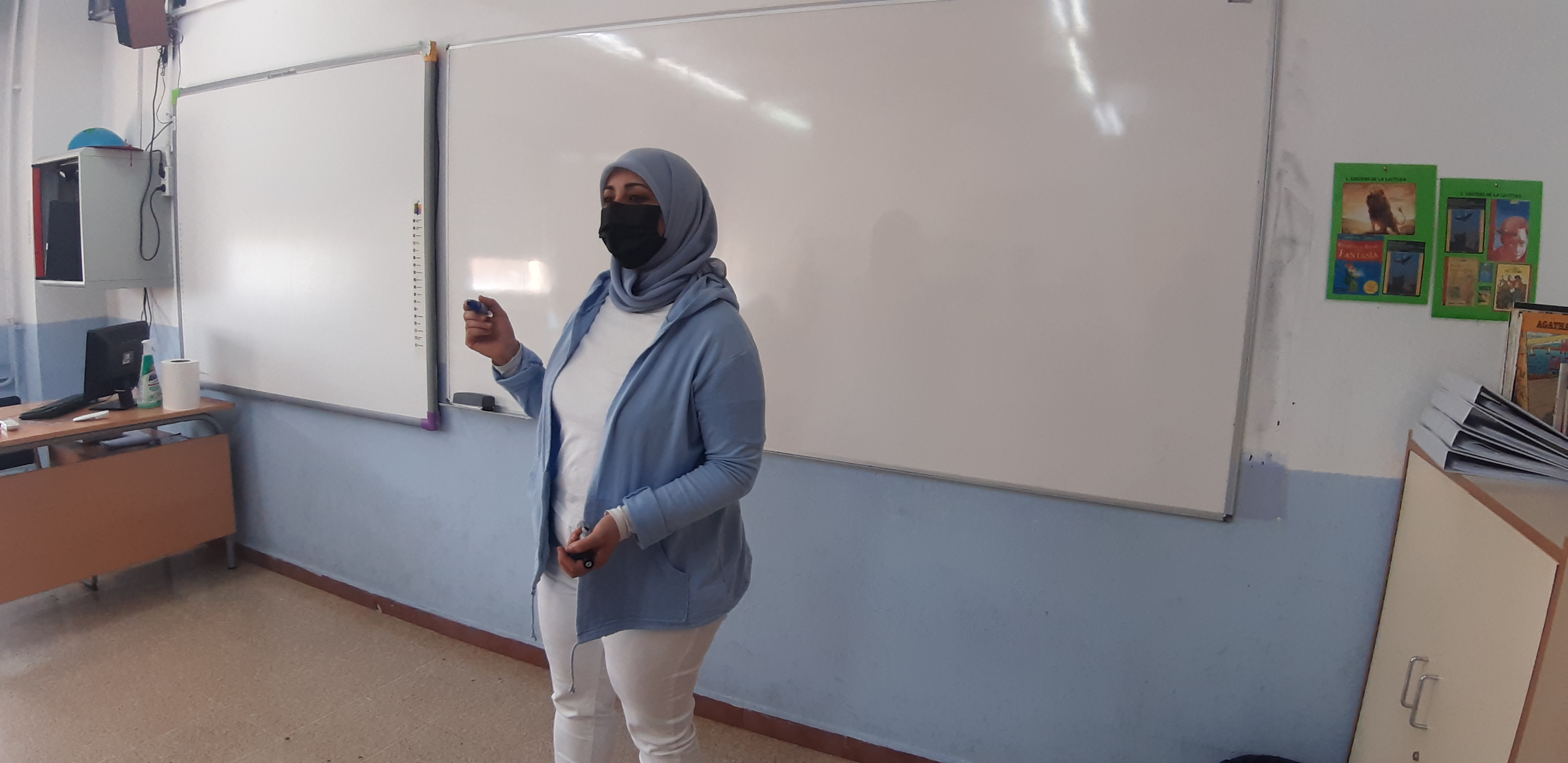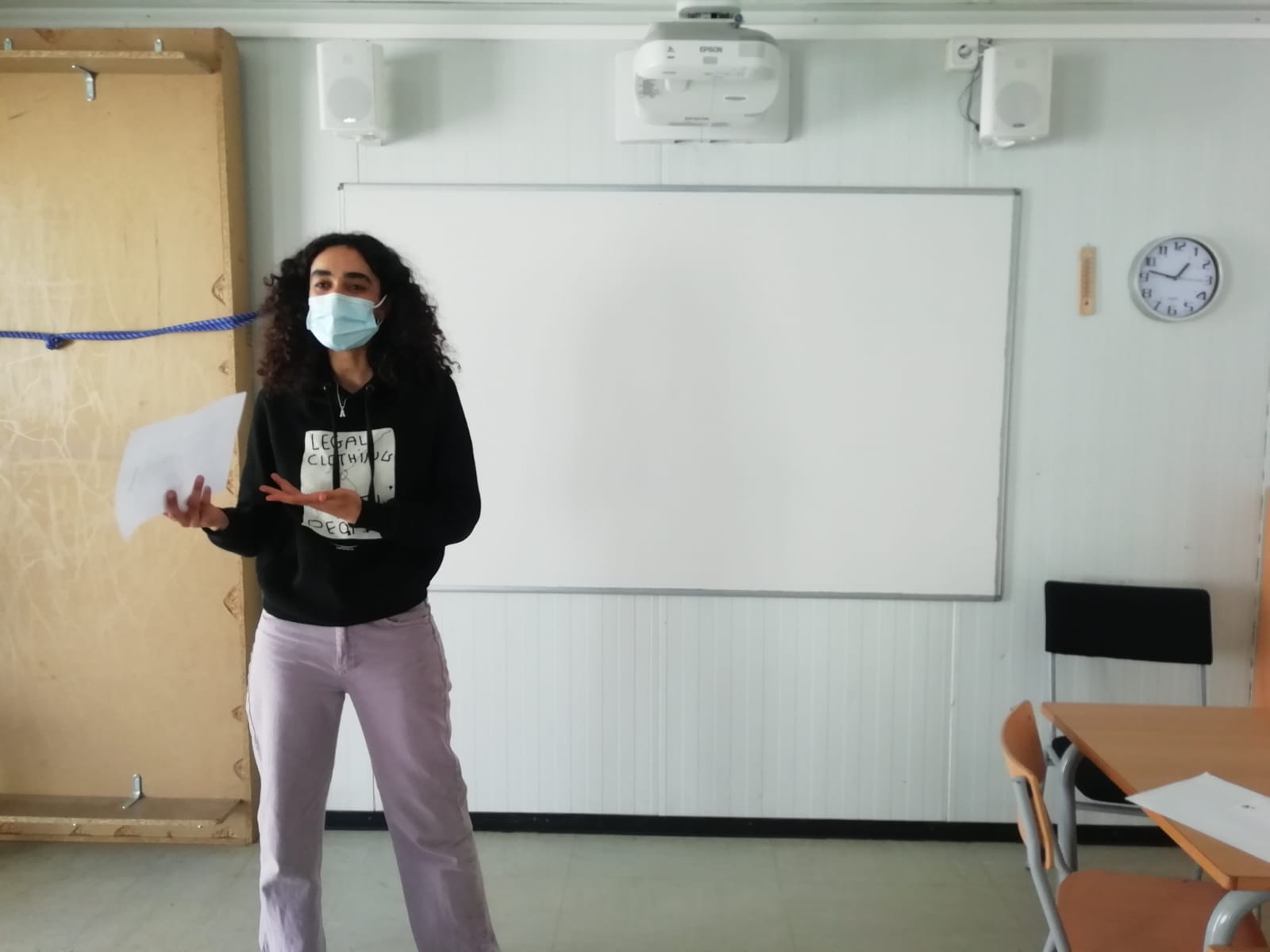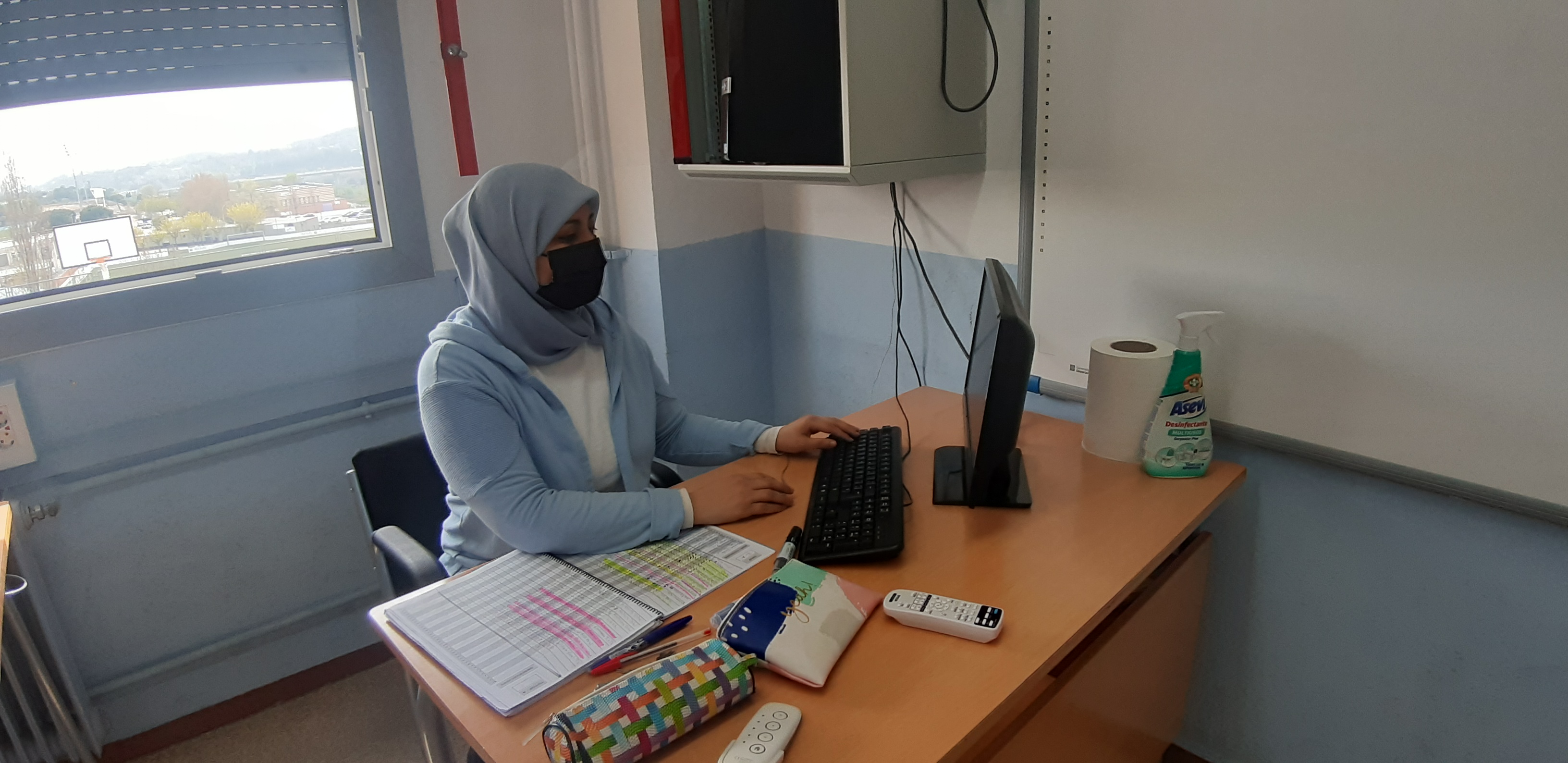“We could never have imagined that teaching was an option for”
22/04/2021

REPORT
The lack of teachers with a migrant background limits the range of educational role models and leads migrant pupils to think that teaching is not a job that is fitted for them. The shortage of such teachers also implies lower expectations of academic performance and the reproduction of socioeducational inequalities.
Nawal Eddars has been a Catalan language and literature teacher for three years and it has been 14 years since she first came to Catalonia from Morocco, where she had been a primary school teacher. Once she settled in Catalonia, she took a bachelor’s degree in Catalan and French language and literature studies with a view to devoting herself to secondary school teaching. Nawal is the only migrant teacher at the secondary school in Terrassa where she works and she is one of the few non-European foreign teachers in the Catalan educational system.
Even though the schools here have a steadily increasing number of pupils of foreign nationality (last year such pupils represented 14.9% of the total and the majority were from Morocco), this diversity is all but completely absent in the teaching staff. At Nawal’s secondary school, for example, 80% of the pupils have a Moroccan background but she is the only migrant teacher there.
“Many pupils say that I’m a role model for them and that I motivate them to learn and to continue their studies”, explains Nawal. She even says that there are families, both of foreign pupils and pupils born in Catalonia, who use her as an example to encourage their children not to leave school: “One day a mother said to her daughter that if I had been able to achieve what I wanted, she could do it too”. Indeed, Nawal doesn’t hide her satisfaction: “When I come to the school and see where I am, I feel proud”.
Alain de la Guardia has also noticed that he is someone whom pupils take as a role model. Alain was born in Cuba 28 years ago and came to Catalonia when he was seven. This year he began to work as an English teacher in a secondary school in Sabadell and he sees that pupils, and above all those of Latin American background, look at him in a special way: “They talk to me in a more familiar manner and if they have any problems, they always turn to me”, explains Alain, who also thinks that his youth helps to make him more accessible as well.
“My father’s name is very Moroccan so I invented one that resembled more closely the names of the other of kids' fathers”
To be sure, people like Amal Chugri and Sihame would have liked to have had teachers of migrant background when they went to school. Both of them are daughters of Moroccan families who came to Catalonia 30 years ago. Even though they were born here, however, at primary and secondary school they sometimes felt that they didn’t fit in. Amal recalls, for example, that in secondary school, when they carried out activities in connection with festivities of Catalonia, no one ever asked her if she celebrated them and neither did they ask her to tell about any Moroccan festivity.
The same thing happened to Sihame. Just like Amal, she was the only pupil of Moroccan background in her class and she admits that, to keep from feeling different, sometimes she even tried to deny her origins: “I remember how one day we were sitting in a circle in the classroom and the teacher asked us all to tell the class what the names the members of our families were... Now, my father’s name is very Moroccan so I invented one that resembled more closely the names of the other of kids’ fathers”.
A lack of role models
Both Amal and Sihame believe that if they had had more diverse teachers, it would have helped them to see “difference as an enriching factor and something natural at school”. In this respect, the two of them have come to choose occupational paths linked to education with the aim of fostering diversity at school. Last year Sihame obtained her degree as a primary education teacher and she has already started working, while this year Amal is studying in the teacher training master’s programme to become a secondary education English teacher.
Even so, they admit that at first they couldn’t conceive of themselves as teachers: “Since we never had teachers of migrant background, we could never have imagined that teaching was an option for people like us”.
According to Moisès Esteban, professor of Evolutive Psychology and Education at the University of Girona (UdG), it is essential that schools should not only acknowledge diversity but that they should also attend to maintaining it. For this reason he thinks that “having a more diverse teaching staff would help pupils to form different social models and would contribute to generating more varied educational expectations”.
This opinion is shared by Martí Manzano, a researcher in Sociology of Education at the Autonomous University of Barcelona (UAB), who admits, however, that the creation of a role model is a “complex process” resulting from the teachers’ capacity to engage with their students, and that this complexity stems from many more factors than just the existence of specific ethnic groups.
Nevertheless, both Esteban and Manzano consider that, in principle, the presence of more diverse teaching staff would have a positive effect on changing prejudices among both pupils and teachers themselves.
Esteban, for example, considers that this could help to counteract what many studies have identified as the “educational deficit perspective”. He explains that this concept is based on the idea that pupils of migrant background or from disadvantaged social environments show, a priori, lower educational performance than other pupils due to differences of cultural, social and economic nature.

Amal Chugri at school // Photograph used with permission.
A higher rate of early school dropout and lower expectations among pupils of foreign background
A recent study led by Sílvia Carrasco, a teacher in Social Anthropology at the Autonomous University of Barcelona (UAB) who specialises in migrations and education, warns that nearly three out of every ten lower secondary school pupils born outside the European Union have the feeling that their teachers do not show any confidence in their ability to complete their studies. Conversely, this perception drops to one in ten among the pupils born in Spain.
The same study reports that twice as many foreign pupils than native pupils drop out of their education early: while amongst young people born in Spain aged 18 to 24 years, the school dropout rate is 16.1%, amongst those born outside the EU it is 32%. The fact of the matter is that lower expectations are transmitted and come to be interiorised by pupils by the Pygmalion effect.
With regard to this topic: School isn’t your thing: The role that schools play in early school leaving
According to Cristina Zhang Yu, a predoctoral researcher in Psychology of Education at the University of Girona (UdG), it may be seen that “schools as an institution are racist because they may exclude pupils who do not fit in with the dominant values”. Cristina says that, for this reason, it is of fundamental importance to start discussing school segregation in terms of racism: “We relate segregation to economic levels but it actually goes far beyond this aspect”. In this respect, she points out that one of the factors that serves to qualify a school as being of high complexity is that it has a large number of migrant pupils.
In Carrasco’s opinion, early school dropout amongst pupils with a foreign background is also explained by the fact that “suitable support elements do not yet exist to compensate the language gap and neither is there a guiding programme between the compulsory and post-compulsory educational stages”.
For example, Carrasco considers that the present model of welcome rooms is a “segregating support that separates newcomer pupils from the others”. In order to avoid this negative effect, she thinks that what is required is an additional teacher with support functions in the ordinary classes and a treatment of diversity that does not involve removing anyone from those classes: “This would speed up the learning of the vehicular language and of the curriculum while establishing ties of friendship with the native pupils”, she says.
In connection with this, Manzano recalls that many studies have shown that the acceptance of pupils by their classmates is of key importance in the dynamics of success, failure and early school dropout. The sociologist also remarks that, for this reason, separating pupils into different level-based groups produces educational inequalities since it leads to a “schoolmate effect” that tends to increase or decrease the expectations and academic performance of pupils depending on the overall level perceived in the group.
Another obstacle is the student composition of the schools considered to be of high complexity, which are precisely the schools attended by most of the pupils with a migrant background. Because of this situation, these are schools that usually show a greater rotation of teaching staff as well as a greater mobility of pupils and families.
In practice, this also makes it more complicated to consolidate teaching teams for the implementation of long-term inclusive projects and, far from raising their expectations, it causes teachers to feel even more overwhelmed and incapable of coping with dynamics of educational exclusion.
A higher rate of early school dropout among migrant pupils also leads to the circumstance that these pupils have a lower possibility of reaching the university level and of becoming teachers. The other stumbling block is nationality, since a person must be of Spanish nationality, be from a member state of the European Union, or be from some other country with which Spain maintains treaties of freedom of movement of workers in order to be employed as a teacher here.
Changing the Civil Service Law
The Catalan Ministry of Education admits that there is currently a “very small number” of teachers with a foreign or migrant background in the Catalan educational system and that most of them are of European nationalities. In fact, the Government of Catalonia does not even have specific data on the teaching staff of migrant background since teachers are only asked about the nationality that they hold at the time of joining the staff.
The Catalan Ministry of Education attributes the small number of teachers with a migrant background to language factors and to the Civil Service Law, which excludes teachers from outside the European Union. Another factor is that, for such teachers to have consolidated their position in this sector, not enough time has gone by since the migratory boom of the opening decade of this century.
Despite this, the Catalan Ministry of Education’s Secretary of Educational Policies, Carles Martínez, admits that a change of the law would have a positive effect by making it possible for more teachers to gain access to the educational system: “Defending plurilingualism and interculturality also opens up our system to more diversity amongst our teaching staff”, states Martínez.
Neither does Carles Martínez rule out the possibility of applying the same strategy of school promotion which the Catalan Ministry of Education has been deploying with respect to pupils of the Gypsy ethnic group since 2006. This involves the contracting of people from the Gypsy community who act as role models and “school promoters” at schools with a high percentage of Gypsy pupils and a high level of absenteeism.
The school promoter attends to fostering the tie between families and the school, following the progress of pupils and watching out that the values of Gypsy culture are present in the school curriculum. “It's a matter of social cohesion”, says Martínez.
Indeed, researchers such as Zhang Yu regret that the Gypsy community is not present in teaching staffs either. For sociologists like Manzano, the day that there come to be more teachers of migrant background, “schools will function better as a social elevator and will cease to be a place where inequalities are reproduced”.

Eddars recording marks // Photograph used with permission.